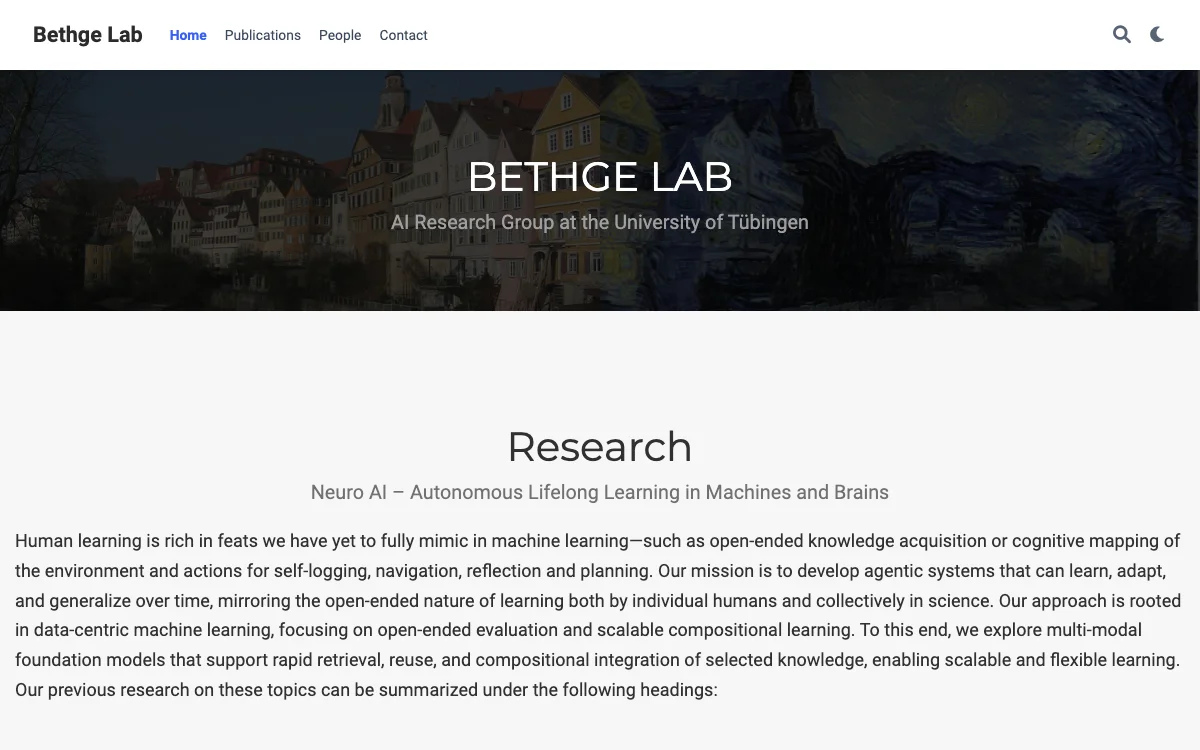Bethge Lab, based at the University of Tübingen, is at the forefront of AI research. Their mission is to develop agentic systems that can learn, adapt, and generalize over time, mirroring the open-ended nature of human learning. Their approach is rooted in data-centric machine learning, with a focus on open-ended evaluation and scalable compositional learning. They explore multi-modal foundation models for rapid knowledge retrieval, reuse, and integration. The lab's research encompasses various areas, including open-ended model evaluation and benchmarking, language model agents, lifelong compositional learning, modeling brain representations, attention in humans and machines, and AI sciencepreneurship. They collaborate with several institutions and are involved in initiatives like the Bundeswettbewerb für Künstliche Intelligenz and IT4Kids. Bethge Lab is also part of ELLIS, contributing to the advancement of learning and intelligent systems in Europe.

Bethge Lab
Bethge Lab conducts diverse AI research, from model evaluation to brain modeling, with a focus on scientific advancement.

Top Alternatives to Bethge Lab
SRI
SRI is an AI-powered R&D institute with diverse offerings
Atomic AI
Atomic AI is an AI-powered RNA drug discovery platform
Immunai
Immunai supports drug discovery with AI-powered solutions
EvoLogics
EvoLogics offers underwater communication and positioning solutions
Bethge Lab
Bethge Lab is an AI research group with diverse focuses
Receptive AI
Receptive AI enhances workplace inclusivity and psychological safety, boosting employee retention.
Galactica Demo
Galactica Demo is an AI-powered research tool designed for the scientific community to explore and reproduce AI research findings.
Quilter
Quilter is an AI-powered PCB designer that automates circuit board layout, optimizing designs for performance and manufacturing.
Labelbox
Labelbox is an AI-powered data labeling platform that helps users build better AI products remarkably fast.
Taalas
Taalas is an AI-powered platform that transforms AI models into custom silicon for 1000x efficiency.
Nextml
Nextml specializes in custom machine learning projects, enhancing satellite image analysis, railroad infrastructure damage detection, and text recognition in industrial settings.
Data Science & AI Workbench
Data Science & AI Workbench is a comprehensive platform that accelerates AI project development and deployment with robust security and governance.
Lambda | GPU Compute for AI
Lambda provides on-demand NVIDIA GPU instances and clusters for AI training and inference, designed for developers.
Granica AI
Granica AI enhances AI projects by optimizing data management for compactness, safety, and efficiency.
Azure Machine Learning
Azure Machine Learning is an enterprise-grade AI service that supports the end-to-end machine learning lifecycle, enabling businesses to build, deploy, and manage ML models at scale.
FlyPix
FlyPix is an AI-powered geospatial platform that helps users detect and analyze objects on Earth’s surface with precision.
Human or AI Game
Human or AI Game is an interactive platform that challenges users to distinguish between human and AI-generated images, contributing to academic research.
KBY
KBY-AI offers advanced SDKs for identity verification, including face recognition, liveness detection, and palm recognition, enhancing security and user experience.
VortiX
VortiX is an AI-powered search engine that helps users find precise scientific research papers with clear explanations.
Rayyan
Rayyan is an AI-powered platform that accelerates systematic and literature reviews, saving researchers significant time.
BioRaptor
BioRaptor is an AI-powered platform that helps scientists extract actionable insights from bioprocess data to enhance product development.